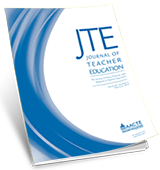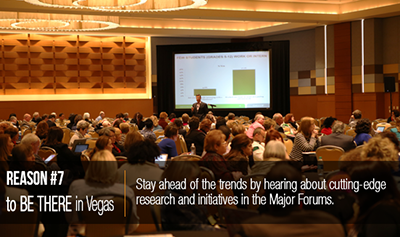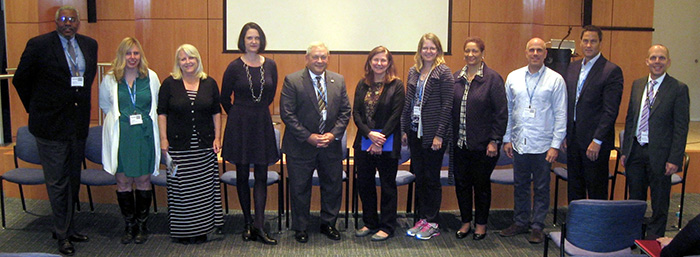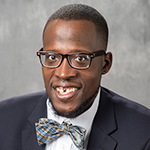08 Dec2015
By Gail Richmond and Alyssa Hadley Dunn
The events that recently took place at the University of Missouri are not isolated incidents. Sadly, they are only the most recent examples of a growing trend and reflect the injustices on campuses and in communities across the United States and worldwide. Rather than use this space to recapitulate these events, we instead consider how and why the field must be responsive to these injustices, how we should use these events to make decisions about instruction and about the culture we establish in our classrooms, and how we might use our scholarship to aid in the struggle for justice.
On one hand, acts of injustice seem incompatible with the culture of higher education—which is supposed to support rational thinking, human rights, and informed debate. Yet even at institutions of higher education, where most individuals consider themselves scholars, each of us carries with us experiences, prejudices, and perspectives that are not informed by scholarly work or debate. We cannot take the position that we are “above” the prejudices and stances which have long personal and sociological histories.
08 Dec2015
By Gail Richmond
 The editors of the Journal of Teacher Education (JTE) invite manuscripts for a special issue on preparation for teaching to changing standards (e.g., Common Core, Next Generation Science Standards, C3 Framework for Social Studies Standards). Manuscripts are due February 15, 2016.
The editors of the Journal of Teacher Education (JTE) invite manuscripts for a special issue on preparation for teaching to changing standards (e.g., Common Core, Next Generation Science Standards, C3 Framework for Social Studies Standards). Manuscripts are due February 15, 2016.
The Common Core State Standards for mathematics and for English/language arts have been adopted by more than 40 states. Many states have either adopted or are considering the Next Generation Science Standards. The C3 Framework for Social Studies Standards was intended to provide guidance to states wishing to revise their standards.
17 Nov2015
By Laurie A. Henry and Cindy Diehl Yang
The AACTE Clinical Practice Commission (CPC) has been working over the last 6 months to examine the state of clinical practice in educator preparation. With a charge to develop a white paper that provides a common understanding of effective approaches to field experiences and clinical practice, members of the CPC met for a 2-day working session in Washington, DC, in August.
Members of the commission, who represent institutions of higher education, PK-12 school districts, and professional associations, formed workgroups around the core topics that will provide a foundational structure for the white paper: literature review, foundations of theory, foundations of practice, lexicon, and current context and policy background.
17 Nov2015
By Jerrica Thurman
Ed Prep Matters is featuring “Stories of Impact” to showcase AACTE member institutions with educator preparation programs that are making a positive impact in their communities and beyond through innovative practices. We are committed to sharing members’ success stories and encourage you to do the same.
 The University of North Carolina (UNC) system offers the public a variety of data on its institutions’ work through the UNC Data Dashboard. A series of specialized pages provide overviews of areas from research and development to graduates’ job placement, all in the name of boosting transparency for taxpayers, students, and other stakeholders.
The University of North Carolina (UNC) system offers the public a variety of data on its institutions’ work through the UNC Data Dashboard. A series of specialized pages provide overviews of areas from research and development to graduates’ job placement, all in the name of boosting transparency for taxpayers, students, and other stakeholders.
17 Nov2015
By Amanda Lester
On November 3, the Wallace Foundation hosted a policy briefing in Washington, DC, to highlight findings from its recently released report, Developing Excellent School Principals to Advance Teaching and Learning: Considerations for State Policy. Commissioned by the Wallace Foundation and authored by Paul Manna, professor of government and policy at the College of William and Mary (VA), the report addresses the question What can state policy makers do to help ensure that schools have excellent principals who advance teaching and learning in their schools?
During the briefing, Manna presented findings from the report with a focus on the changing role of the principalship, the principal’s position as multiplier of effective teaching and leadership practice, and the impact of state policy making on principal effectiveness. Wallace Foundation President Will Miller underscored these perspectives in his introductory remarks: “There’s growing recognition that principals should no longer mainly be thought of as managers of buildings and bus schedules,” he said. “Indeed, effective leaders are their schools’ chief improvement officers—strengthening instruction, building a culture of high achievement, and supporting teachers and other educators to boost student performance.”
16 Nov2015
Congratulations to November Scholar of the Month Leonard D. Towns!
By Whitney Watkins
 Towns is a doctoral candidate in the Department of Educational Foundations, Leadership, and Technology at Auburn University (AL). His research interests include educational theory, policy, and program evaluation.
Towns is a doctoral candidate in the Department of Educational Foundations, Leadership, and Technology at Auburn University (AL). His research interests include educational theory, policy, and program evaluation.
His role as an adjunct professor in the Department of Psychology at Tuskegee University (AL) has allowed him to mentor future scholars and professionals. His encouragement of research has resulted in conference presentations by his students.
10 Nov2015
By Sharon Robinson
A set of nine laudable principles to advance the teaching profession undergird an ambitious campaign organized by the Center for American Progress (CAP) that launches today. The new initiative, TeachStrong, targets improvements at every stage of the educator pipeline, from recruitment and preparation through licensure and career pathways, calling for a much-needed shift in focus in education policy away from test-and-punish accountability and toward strengthening the teaching profession.
TeachStrong attempts to elicit a common tune from the cacophony of voices across the education sector—from AACTE and the National Board for Professional Teaching Standards to the National Council on Teacher Quality and Teach for America—with a “Path to Modernizing and Elevating Teaching” comprising nine goals:
27 Oct2015
By Guneev Sharma and Kristin McCabe
A new study out of the National Center for Education Statistics (NCES) helps debunk the oft-repeated assumption that half of new teachers leave the profession in the first 5 years. Overall, some 77% of participants in the Beginning Teacher Longitudinal Study continued teaching for 5 straight years, and the rate was even higher (80%) for those who had a mentor or participated in an induction program—just two of the many influences on teachers’ career paths studied for the report.
Career Paths of Beginning Public School Teachers first scrutinizes both broad and detailed career paths of 155,600 teachers who began their classroom career in the 2007-08 academic year. Then it looks at a subset of 1,440 teachers’ characteristics in their first and in their final year of teaching, covering personal demographics, student and school factors, and professional preparation and in-school supports.
20 Oct2015
By Whitney Watkins

Congratulations to October Holmes Scholar of the Month Coralis Solomon!
Solomon is a second-year doctoral student in the counselor education program at the University of Central Florida (UCF). Her research interests are mindfulness and self-compassion in counseling.
Solomon has worked in La Amistad, a community agency where she provided mental health services to individuals suffering from traumatic experiences. She is currently coordinating an in-school community counseling clinic for a partnership with the UCF counselor education program and Seminole County Public Schools. This endeavor is serving as an excellent opportunity for counseling students to get a chance to work with a population they may not see in the clinic on campus. In addition, this partnership offers free services to families so they can take advantage of mental health counseling that they may not otherwise be able to afford.
13 Oct2015
By Jerrica Thurman

Only 1 day is left to take advantage of the Early Bird Registration rate for AACTE’s 68th Annual Meeting in Las Vegas, Nevada! This special offer expires October 14 at midnight EDT.
At the Annual Meeting, you’ll gain access to cutting-edge research and initiatives for “meeting the demands of professional practice” in educator preparation. Experience some of the most popular offerings of the conference in our six major forums for 2016.
06 Oct2015
By Sharon Robinson

Participants in the 2015 National Technology Leadership Summit included the heads of educator preparation associations for literacy, English, special education, engineering, science, mathematics, and more.
Last week, AACTE hosted an annual technology summit for the leaders of 10 teacher educator associations that formed a coalition in 2000 around educational technology and educator preparation. This 2-day event has witnessed or directly led to some amazing developments over the years, ranging from research to tools to entirely new technologies, as coalition members serve as a unique focus group and visionary working network bridging education and industry.
02 Oct2015
By Whitney Watkins

Congratulations to September 2015 Holmes Scholar of the Month LaMarcus Hall!
Hall is a second-year doctoral candidate in the curriculum and instruction program at Purdue University. His research interest is cultural spaces for underrepresented minorities in higher education.
Since joining the Holmes Scholars Program at the beginning of this summer, Hall has made a breakout performance in his role as a Holmes Scholar at his institution. His nominator was incredibly impressed with his contributions to the field, as well as his array of other accomplishments.
29 Sep2015
By William Henk, Shelley B. Wepner, Sharon Lovell and Steven A. Melnick
Very little is known about education deans’ perceptions of what they think is important for their actual, effective performance on the job. To address this knowledge gap, we invite deans to participate in a national survey, which we are conducting with AACTE’s support, that will tap education deans’ beliefs about their essential ways of thinking, being, and acting.
But first, here is some more background. In short, effective leadership of a school, college, or department of education (SCDE) is vital in light of both internal and external forces that provide significant challenges for these academic units. For instance, in the realm of teacher preparation, education deans and directors must articulate their role as leaders of change in the field. This charge includes determining ways to provide concrete evidence of how their programs broaden and deepen the learning and mastery of their teacher and leadership candidates, and also the learning that takes place in the classrooms of their graduates.
29 Sep2015
By Sharon Leathers and Nanette Missaghi
New data illuminate the growing problem of the lack of diversity in the teacher workforce and reframe teacher diversity as an “educational civil right” for students. The Albert Shanker Institute’s recent report on The State of Teacher Diversity in American Education names teacher diversity as a crisis in the educator workforce—the very topic being addressed by the 10 institutions participating in a Networked Improvement Community (NIC) sponsored by AACTE. Specifically, AACTE’s effort seeks to identify strategies to boost the number of Latino and Black men in the education profession.
The authors of the Shanker report studied research and data on teacher diversity from 1987 to 2012 in nine cities in the United States. The report shows that for the period of 1987-2012, the percentage of the students of color changed from 23% to 37% (a 14 percentage point increase). For the same period, the percentage of teachers of color rose from 12% to 17%—a mere 5 percentage point increase. This shows that the rate of increase of students of color is far (almost three times) greater than the increase in the percentage of teachers of color. Therefore, this is a crisis not only in the decline of numbers of young people seeking education careers, but the absence of young people of color choosing the profession at the same rates as the number of students of color enrolled in the nation’s schools.
25 Sep2015
By Kristin McCabe
Teacher educators and teacher candidates have new resources in two high-level summaries of the research on learning. By distilling and organizing the existing research on cognitive science and educational psychology, the reports offer teacher candidates concise summaries of high-impact practices grounded in scientific evidence and professional consensus around PK-12 learning. Teacher preparation programs might find them valuable as resources to tie together learning science concepts that are integrated across multiple courses.







 The editors of the Journal of Teacher Education (JTE) invite manuscripts for a special issue on preparation for teaching to changing standards (e.g., Common Core, Next Generation Science Standards, C3 Framework for Social Studies Standards). Manuscripts are due February 15, 2016.
The editors of the Journal of Teacher Education (JTE) invite manuscripts for a special issue on preparation for teaching to changing standards (e.g., Common Core, Next Generation Science Standards, C3 Framework for Social Studies Standards). Manuscripts are due February 15, 2016. The University of North Carolina (UNC) system offers the public a variety of data on its institutions’ work through the
The University of North Carolina (UNC) system offers the public a variety of data on its institutions’ work through the  Towns is a doctoral candidate in the Department of Educational Foundations, Leadership, and Technology at Auburn University (AL). His research interests include educational theory, policy, and program evaluation.
Towns is a doctoral candidate in the Department of Educational Foundations, Leadership, and Technology at Auburn University (AL). His research interests include educational theory, policy, and program evaluation.



